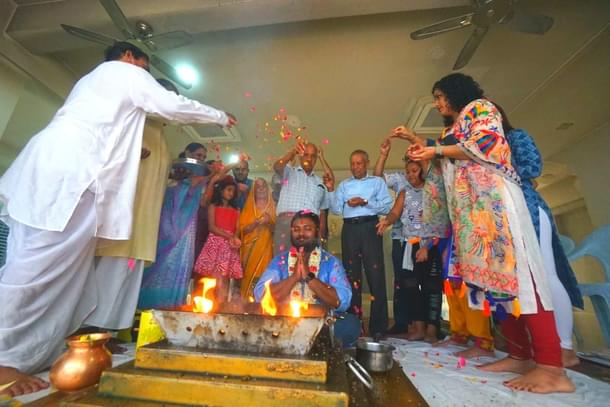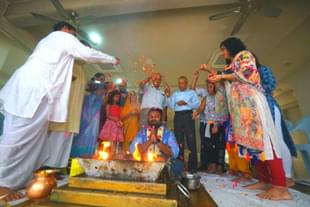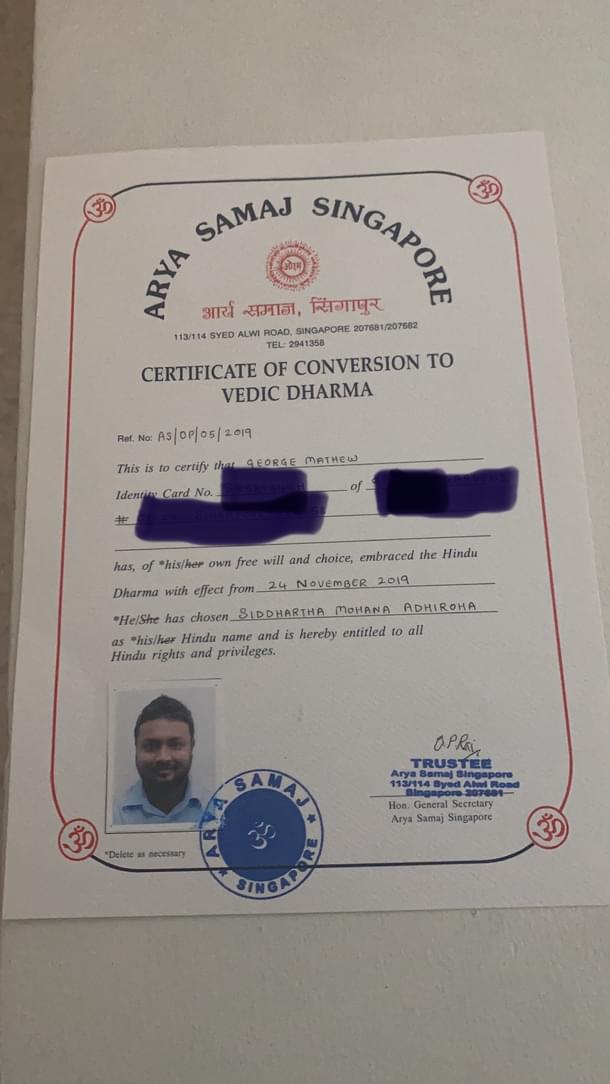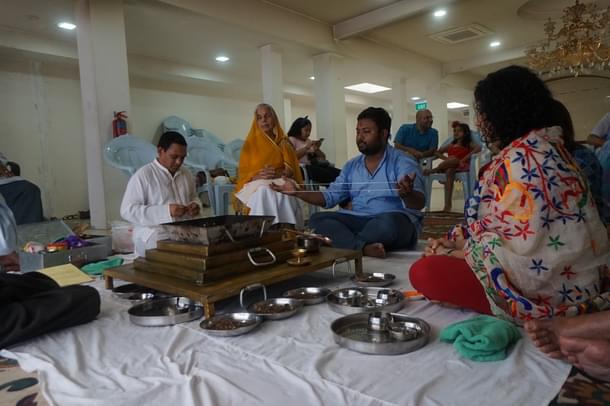Culture
Ghar Wapsi: How George Mathew Became Siddhartha Mohana Adhiroha
Arihant Pawariya
Jan 06, 2020, 12:35 PM | Updated 12:50 PM IST
Save & read from anywhere!
Bookmark stories for easy access on any device or the Swarajya app.


Born in a Syrian Orthodox Christian family in Kerala’s Kottayam district, George Mathew never liked the name he was given at birth. It always felt very alien to him. But for a long time, he believed that changing name didn’t matter much.
However, something snapped inside him in 2018 and he decided to take the plunge to go through the formalities and take a name that would resonate with his changed religious views because ‘George Mathew’ seemed like a forced label that had been assigned to him.
After more than three decades of sticking with this identity, he decided to discard it as the inner voice of his conscience overpowered the resistance he felt while putting himself through soul-sapping sarkari formalities in India.
“I was comfortable with the status quo. I thought naam mein kya rakha hai (what’s in a name). Everyone around me knew who I was. They were comfortable with my views so my name didn’t matter much,” Siddhartha Mohana Adhiroha tells Swarajya why he decided to formally change his name and his religion.
"I didn’t feel the need to prove anything to anyone. But the reason I decided to take the formal step was, the more I looked around me and saw how Hindus were maligned everywhere, especially in the media, I have actually sat down and cried over the situation,” says Siddhartha.
He terms it as the final nail in the proverbial coffin.

Until recently, Siddhartha’s views on Hindu organisations like Rashtriya Swayamsevak Sangh were not charitable. The reason is again the same vilification campaign that is being run for decades by a certain section to paint anything Hindu as ‘villain’. But as he read more and more about the RSS, his views changed drastically.
“There is so much vilification of a millennia-old unbroken and continuous culture. It’s pathetic the way it’s being maligned and I saw no one standing up for it or the people who subscribed to it,” he says
“Of course, at that time I wasn’t on social media and didn’t know that there is indeed a big community comprising of thousands of individuals, who take time out of their busy lives, and are fighting for it daily. I didn’t know about this huge community on Twitter or Facebook and other platforms which is not willing to take it lying down anymore,” he adds.
Initially, the idea was to just change the name. But when he approached a law firm in Bengaluru to initiate the procedure for changing name, they enquired if he was also changing his religion.
“I had asked around if there was any way to convert to Hinduism but no one knew. So, I thought maybe there is no way to convert back. I have seen many billboards informing about ways to convert to Christianity with contact numbers on them, but no such information is available that easily about converting to Sanatan Dharma. But this firm in Bengaluru suggested that I can easily do so my by approaching an Arya Samaj temple which is what I did,” he says.

Siddhartha wanted a good Sanskrit name for himself, and he searched on the Internet where he came across a few posts by Nityananda Misra, Sanskrit scholar and author, who uses the social media, primarily to counter falsehoods around Sanskrit baby names propagated by some famous and top websites due to which many parents are misled and end up giving their children weird names, some of which have terrible meanings.
Misra provides online consultation to parents, who wish to give proper Sanskrit names for their children. Misra charges a small fee for his time.
When Siddhartha announced his ‘ghar wapsi’ on Twitter and thanked Misra for helping him out, Misra explained the importance of his full name.
“Siddhārtha is a name of Śiva (Śiva-sahasranāma, Mahābhārata). Mohana is an epithet of Śiva (Apte dict.). Adhiroha is a name of Śiva (Śiva-sahasranāma, Mahābhārata),” he tweeted.
Siddhartha said he requested for three names from Misra instead of just one.
“Misra ji normally gives one name and that too for new-born children. On the other hand, I was an adult. Also, my request for three names must be something new for him. But he was very patient and he gave me two-and-a-half hours. We talked on Skype. He came up with a lot of suggestions and then we finally settled on this name,” says Siddhartha.
It was his wish to get a name from Siva-Sahasranama.
Siddhartha credits his affinity and love for Sanskrit to Kendriya Vidyalaya (KV), where he did his schooling, and where he learnt Sanskrit from Class IV to Class X.
“Now there is a huge controversy over chanting of ‘asatoma sadgamaya’ as part of morning prayer in KV. The matter has been sent to a constitution bench to decide if it’s not in contravention of the Constitution. It is very unfortunate that this prayer which is one of the most happy and pleasant memories I have of my school, is being made controversial and put under the lens of secularism,” he says.
“Sanskrit is at the heart of our culture and if you take that out, then that would be a tragedy. It’s such an inclusive and beautiful prayer and everyone, irrespective of their religion, can connect to it. As Rajiv Malhotra ji says that we may belong to different religious but its important that we are swadeshi first and I like his coinage of swadeshi Muslims and swadeshi Christians,” says Siddhartha, and tells that his family, though still Christian, are very much swadeshi in their cultural outlook and they put the country first before the religion.
Sanskrit scholar and author Rajiv Malhotra has been a big influence on him.
Siddhartha has taught himself many rituals from different sources.
“I kept adopting the rituals which made sense to me. I have learnt guru puja and a prayer to recite before eating. I have observed that my behaviour and those of people around me changes around Amavasya or Poornima. So, certain rituals that I have started performing have helped me deal better in day to day life,” he says.
Siddhartha says that he has considered Osho as his guru for the longest time.
“This might seem as a contradiction because Osho rejects all sorts of rituals and traditions but I am very much comfortable with this contradiction because he is speaking at a certain level of Advaita,” he says.
Another personality, who has had a huge impact on Siddhartha’s mind, is Adi Shankara.
“Around seven years back, I was in Kochi and I had some time to kill and I asked my driver if he knew any place nearby which I could visit. He suggested I go to Kalady, the birthplace of Adi Shankara. At that time, I had not even heard of his name, let alone read him. So, we went there. I was blown away. There is a beautiful multi-storey temple. I visited the home where Adi Shankara was born. The whole atmosphere was so great and I enjoyed it so much that I have visited Kalady six times since then. He has been a great pull,” says Siddhartha.
One of the most important questions that comes up when one talks about converting to Hinduism is about the caste. But this consideration didn’t bother Siddhartha.
“Caste was never a factor for me growing up. It wasn’t part of my lived reality,” he says.
Siddhartha got engaged last year to a girl from Hindu-Punjabi family, which migrated from Pakistan during Partition.
“I still don’t know her caste. It’s a topic of discussion which never comes up. She has been very supportive of me. Her family is the most open-minded and liberal people I know. My former name didn’t bother them but they also didn’t discourage me when I wanted to convert,” Siddhartha says.
However, some of his family members have not been as supportive of him and he has had to face a lot of social pressure for his Hindu way of life.
“When I was around 20 years of age, I started following more and more Hindus rituals, applying vibhuti and all, my mother got worried. Her concern wasn’t that I was following Hinduism but about how others in our social circle would react. She even arranged for a Christian priest who took me to his office, talked to me for a couple of hours in an attempt to win me over, but in vain,” he says.
Since then there has been constant, low-grade pressure from members of his extended family to get him rebaptised.
“Whenever a family member would come visit us or if i go to them, they would invariably gift me a copy of Bible. After a while, I got irritated and told them to stop. Even in family conversations, this topic would come up and they would tell me to not forget Christ,” says Siddhartha.
“There were indirect threats as well of god’s punishment, that if I reject the god, I will have to face his wrath. And so on. They tried both carrot and sticks but when such things go on for 15 years, you get inoculated,” he says laughingly.
Siddhartha‘s father also tried to have a conversation with him on the matter, though his concern was very practical.
“He told him that it would be hard for him to marry in the Christian community because it is the Church which gives the marriage certificate and if he is not a Christian, it would be very difficult. I told my father that I will find the girl. That’s not the problem. But I wouldn’t be held ransom by some Church in lieu of a certificate,” he says.
“Of course, I realise, I could do so because I was blessed, privileged, independent, educated and self-dependent but for most of the poor people who have little social mobility, its very hard for them and they are stuck as the incentives to stay Christian are many,” says Siddhartha.
Siddhartha’s family, both his mother’s and father’s side, converted to Christianity five generations back and though this wasn’t forced, the incentives did play a part.
“We have a sort of oral story within the family, passed down from one generation to another, how my great great grandfather converted. They were practicising Hindus who would regularly go to temple and follow the rituals and traditions. Missionaries were very active at that time and they distributed Bibles, which were not just translated into Malayalam but in a lyrical form that Hindus are accustomed to reading their scriptures in. So, my great great grandfather would read both the Bible and Hindu scriptures. Then, over a generation, the formal conversion happened,” he narrates the story.
“There were certainly incentives which sort of worked as a pull factor. Those in the family who were very bright got the opportunity to travel to the UK and study there. Those who were not that bright got similar opportunities for studies and work in institutions run by missionaries when the British were ruling the country. They converted because they saw in it a pathway to opportunities that wouldn’t have been available otherwise,” says Siddhartha.
Siddhartha started his journey back to Sanatan Dharma during his teenage years. One of his uncles, who was a devotee of Mata Amritanandamayi introduced him and other children in the family to meditation. He would sit under a tree and practice meditation for hours.
At 15, he went to a temple in Kottayam for the first time. These were the triggers which pulled him towards Hinduism.
“Whenever I had an opportunity, I would go to a temple and just sit there and curiously observe. I would really enjoy the atmosphere and the vibes there. Initially, it felt alien and there was no one to answer many questions that I had. But inside, something felt very familiar and I got drawn into it. As I grew up, I started reading up and that’s that,” Siddhartha tells how it all started.
It’s been around 20 years since that first visit to a temple in his hometown. The serene atmosphere, which touched chords deep inside his soul helped him return to the religion of his ancestors.
The nagging feeling of being an alien has left him.
“Some might say that spiritual path will not be greatly enhanced by mere name change, given it’s individual nature. However, the social and emotional significance matter to me as well. After all I am the one who had to write the name George five times a day, each time feeling what a foreign name I have,” he says.
Siddhartha, which means ‘one who has accomplished a goal’, has certainly proved his new name right insofar as finding peace with his identity is concerned, as if someone who was lost in the wilderness has returned home. Ghar wapsi, literally.
Arihant Pawariya is Senior Editor, Swarajya.





